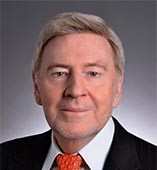|
 Since growing up in Camden, S.C., and attending UNC, Phillip England ’67 (J.D. ’70) has enjoyed a remarkable career in New York City, from counseling high-profile clients in tax law and being honored as a Captive Review magazine “Power 50” to working for former President Bill Clinton. After graduating with a B.A. in history, he attended UNC School of Law and New York University Graduate School of Law in taxation. He started his career as an associate with Cadwalader, Wickersham & Taft L.L.P., moved to R.J. Reynolds Industries as head of international taxation and then began working at Anderson Kill P.C., where he has provided counsel for nearly 20 years. Phil describes his time in Chapel Hill and how his experiences as a history student influenced his extraordinary career.
Since growing up in Camden, S.C., and attending UNC, Phillip England ’67 (J.D. ’70) has enjoyed a remarkable career in New York City, from counseling high-profile clients in tax law and being honored as a Captive Review magazine “Power 50” to working for former President Bill Clinton. After graduating with a B.A. in history, he attended UNC School of Law and New York University Graduate School of Law in taxation. He started his career as an associate with Cadwalader, Wickersham & Taft L.L.P., moved to R.J. Reynolds Industries as head of international taxation and then began working at Anderson Kill P.C., where he has provided counsel for nearly 20 years. Phil describes his time in Chapel Hill and how his experiences as a history student influenced his extraordinary career.
Where did you grow up and why did you choose to come to Carolina?
“My family believed in education and UNC was considered to be and is in fact a leading Southern school. You didn’t run into many people in South Carolina who had graduated from UNC so it seemed special. In those days, Chapel Hill was a relatively small university with about 8,000 students. In the South, Carolina was considered equivalent to schools like Dartmouth and Brown. That’s why I came to UNC, and I have had a career I couldn’t have dreamed of because of it.”
Can you share a fond memory you had as a history student in the 1960s?
“I cannot describe the feeling you had in those days at the university. First of all, it was small enough that you could easily walk across the entire campus. There were no bus lines or parking decks so you walked wherever you needed to go—downtown, the bookstores and to have dinner at the Carolina Coffee Shop. In fact, there was a sign on the cash register there that said, ‘limit $10 on checks—good or bad.’ It was a marvelous world. On Friday nights, some of the history students would go to the Rathskeller on Franklin Street for drinks and to talk about history. I especially remember going to Professor Frank Ryan’s office and noticing that he had bookcases to the ceiling filled with books. When I asked why, he said, ‘I’ll never be able to read them all but I just feel comfortable having them here.’ That was the impression that Chapel Hill made and that’s why in my mind it’s still a superb place.”
At UNC, did you have a favorite professor or take any classes that have influenced your career?
“I can still remember my professors in three dimensions; they made that kind of powerful impression on me. I can remember the way they looked and dressed even. Studying in Chapel Hill under them awoke in me a desire to see the great world, and it proved to be a great world. In my career, I have worked on Great Britain’s income tax treaty, and it was Dr. Barbara Schnorrenberg who taught me British history and inspired a lifelong interest in the subject, particularly 19th century British history. One of the major initiatives in the Clinton administration was Central Europe, and it was Dr. Kraehe who taught me Austrian and German history. I have worked on Brazilian and U.S. tax treaties; Dr. Federico Gil taught me Latin American history. I’ve also helped with French treaties and have litigated in the courts of Taiwan and other countries; I remember to this day my history professors and what they taught me. Professors sometimes have no idea of the profound impression they make on a student’s life and work.”
What would you advise history students today?
“When I studied in the history department, Dean Godfrey was and still is considered one of the legendary professors. He taught the first history course I took, and he said something I’ll always remember: ‘We here at the University of North Carolina at Chapel Hill believe in the spirit of the humanities; and of the humanities, history has no peer.’ I shared that quote many times with one of my former partners, Nicholas Katzenbach, who was a fellow ‘old school type.’
“History grounds you in what you are, what you can become and what you have been. I would advise students to study, learn and not be embarrassed by your history. If you don’t know where you’ve been, you have no idea where you’re going, and that’s history in a nutshell. My fondest desire if I could do it all over again would be to teach history. Like Professor Ryan, I now have a library in my home in upstate New York that has over 2,000 books. Like Professor Ryan, I’ll never be able to read them all but I just like having them there.”
— Erin Kelley ’13
